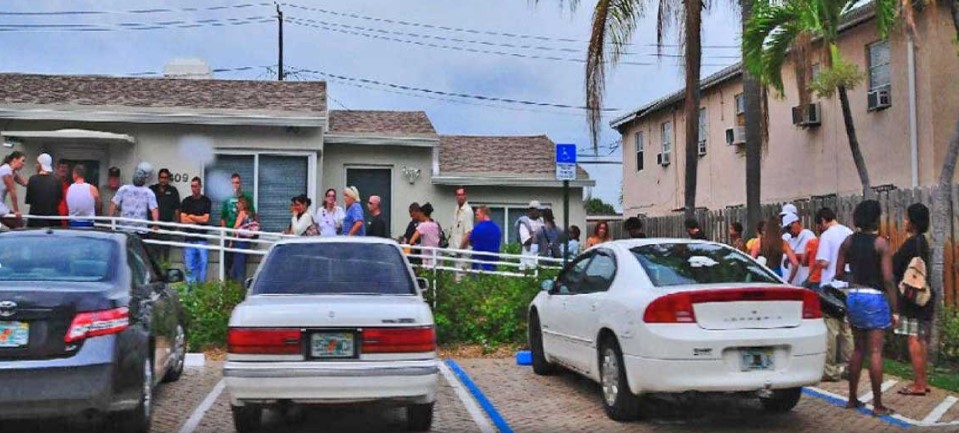
A pill mill is a type of business that prescribes narcotic medications such as pain killers in more significant numbers than would be prescribed in regular physician offices. Investigators came up with the name “pill mills.”
According to the National Drug Intelligence Center, an estimated 7,500 pill mills were operating in the United States. Physicians are increasingly operating pain pill mills disguised as pain relief or pain management clinics, wellness centers, functional medicine clinics, and urgent care centers. These owners and operators continually devise methods to subvert regulations and investigations while attracting local and out-of-state patients.
IMPORTANT NOTE: Not all pain management clinics are engaged in criminal activity. Many clinics across the state operate legally and employ trained personnel and doctors who treat patients who legitimately suffer from pain.
The operation of a drug trafficking network peddling prescription drugs for profit under the guise of a medical practice not only violates the law, it undermines the public confidence in the healthcare profession.
Rogue pain management clinics (pill mills) are a significant source of pain pills available to abusers. Investigations indicate that pill mill operations exhibit several unique characteristics, such as the ability of operators to relocate quickly, nearly exclusive associations with specific physicians and pharmacies, primarily cash-based payment methods, and rapid examinations.
DEARBORN, MICHIGAN. Dr. Mohammad Derani, Dearborn Medical Clinic. The FBI and Michigan State Police raided the Clinic at Warren and Yinger Avenues after residents complained about disorderly conduct, which prompted an investigation. Dr. Derani and his Assistant Manager, Zahra Alwajed, were charged with four counts of delivery of a controlled substance.
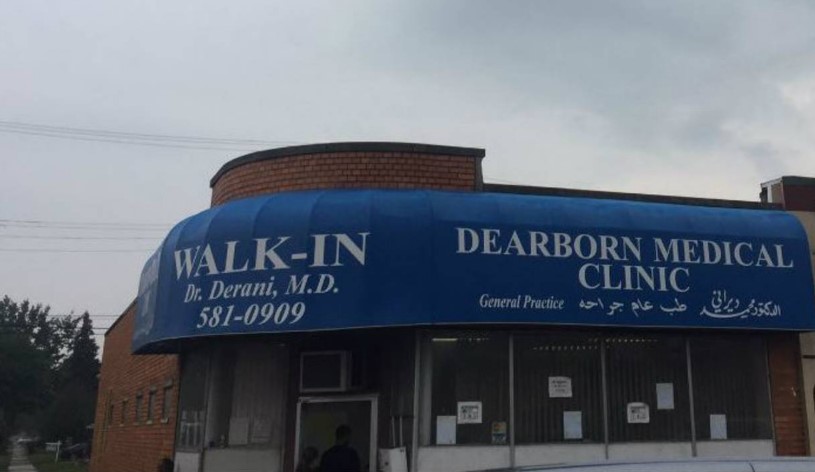
One resident who lived near the clinic had reported several complaints to the police, but they told him to keep calling so the case could be built up through his complaints as well as others. “The Chief kept asking us to be patient because something is coming,” he said. The resident told his neighbors to call the police and complain. He even shared photos and videos he took of drug dealing and filth around the clinic with police as evidence.
The resident said the pill mill trashed the area with beer bottles, garbage, alcohol, and crates.
“These patients would line up at 10 p.m. or 11 p.m. until 9 a.m. when the clinic opened. They often brought chairs and milk crates to sit on and wait. The neighbor said they would urinate in his yard since there were no restrooms available at night.
After learning about the raid on Facebook, other community members shared what they had witnessed when passing by the clinic. One witness said, “Every morning, I pass by there, and I always think it’s Black Friday.”
Data from the Michigan Department of Licensing and Regulatory Affairs shows that Dr. Derani, a West Bloomfield resident, placed among the top productive prescribers of controlled substances in Michigan in 2015 and 2016. Dr. Derani prescribed an average of more than 43 controlled substances each workday between 2015 and 2017—more than 500,000 pills. Investigators revealed that about half of the opioids ended up on the street, and oxycodone—known as a highly addictive narcotic—was his most prescribed drug. Dr. Derani also wrote prescriptions combining drugs that were lethal.
Dr. Mohammad Derani. State Police raid the Dearborn Medical Clinic (YouTube Video)
If you recognize any of these signs, you can submit your anonymous tip through the DEA online Tip Line and report the doctors or facility. Pill mills are a problem. If the citizens of the community report they see signs of suspicious activity and more businesses keep an eye out for the above-mentioned signs as well, hopefully, these pill mills can be limited.
Owners of pill mills have established many cash-only operations that are frequently used by distributors. Moreover, many of these out-of-state distributors and abusers work in teams. These individuals or teams frequently follow a route that traverses the eastern, southern, and western regions before returning north. Some arrange shipments to other states through parcel delivery services.
Law enforcement or regulatory investigations have closed pill mills and suspended the licenses of the associated physicians only to have the owners reopen the business at a new location staffed by other licensed physicians.
Oxycodone was a money-maker for the drug makers, pharmacies, and, through increased patient visits for doctors. By the early 2000s, a cottage industry sprang up – pain management clinics where those with complaints of chronic pain were supposed to find long-term solutions but instead found legal prescriptions for massive doses of the drug. There were no rules. Anyone could open one.
There was one key ingredient, though. Someone with legal authority to prescribe opiates was required, and that meant doctors, physician’s assistants, and nurse practitioners were in high demand.
Florida was considered the epicenter for the trafficking of illegal prescription narcotics. The DEA and local law enforcement shut down more than 250 so-called pill mills, clinics where doctors could sell narcotics directly to people for cash. Now Florida doctors can no longer dispense narcotics directly to patients and wholesalers, which were also fined, are limiting the amount they sell to pharmacies.
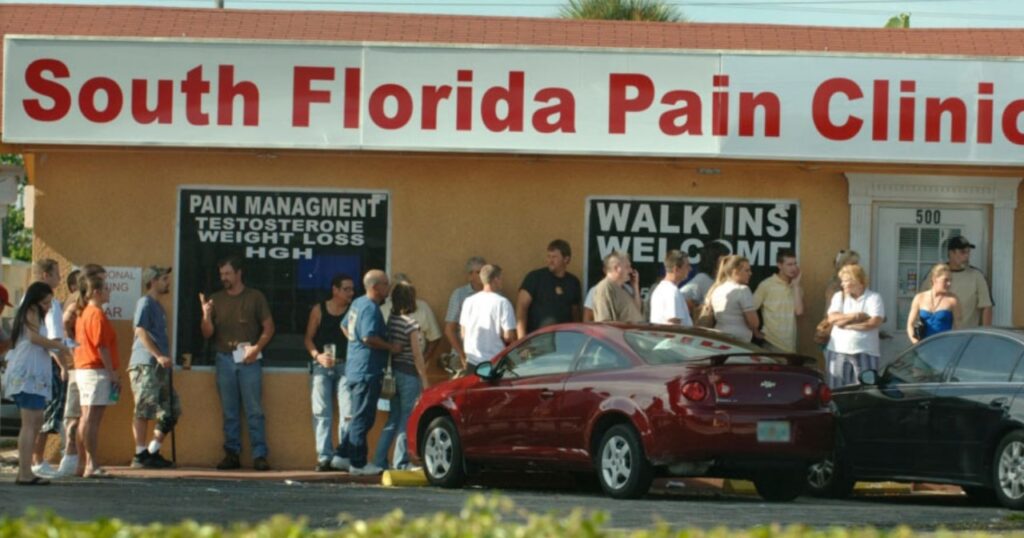
Operation Pill Nation
In February 2011, federal, state, and local law enforcement agencies concluded Operation Pill Nation—an investigation that resulted in the arrest of 22 individuals and the seizure of $2.2 million and 70 vehicles. Among those arrested were doctors who had conspired to distribute and dispense more than 660,000 dosage units of oxycodone.
Operation Pill Nation documented 340 undercover buys of prescription drugs from 60 doctors at more than 40 pill mills in South Florida. According to the indictment, the defendants operated pill mills that offered patients prescriptions for oxycodone and other controlled substances without a proper medical diagnosis or purpose. The indictment alleged that the defendants marketed pill mills as pain management clinics through more than 1,600 Internet sites. Patients using the pill mills were required to make cash payments as a “visit fee” and were often directed to obtain MRI examinations. The pill mills would then purposely misinterpret the MRIs to justify the prescriptions. For an additional fee, the pill mills would falsify the results of patients’ urinalyses to justify high and often dangerous dosages of prescription opioid pain medications (Drug Enforcement Administration).
What is Oxycodone and How Is It Used (United States Drug Enforcement Administration)
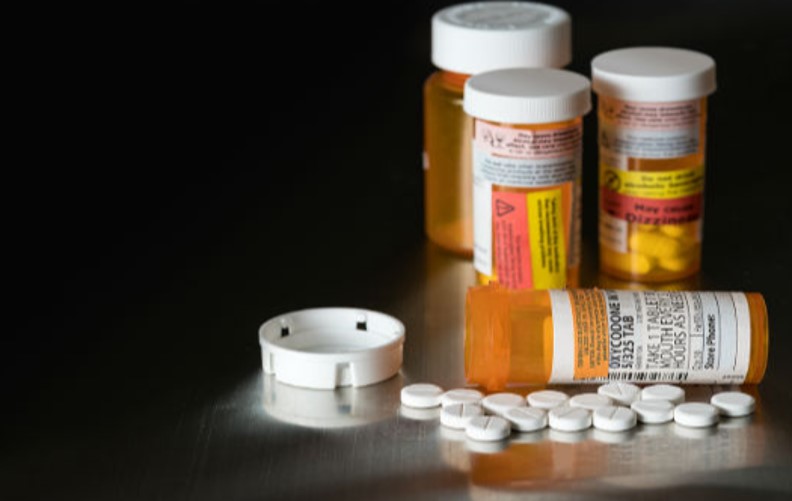
What Are Pill Mills?
Pill mills are places where people can get prescription drugs without a legitimate medical reason. In most cases, pill mills are run by doctors or other healthcare professionals who prescribe drugs like opioids for cash. These prescriptions are often given without any medical exam or testing, and they’re usually offered in large quantities. Pill mills fuel the opioid epidemic by making it easy for people to get their hands on these dangerous drugs.
Often, these operations are in rural areas or small towns without many healthcare options. This means that people have to travel long distances to get to a pill mill, making it even easier for them to become addicted to the drugs they’re prescribed.
Pill mills are often located in storefronts or strip malls and usually don’t have any medical equipment on site. In some cases, people who work at pill mills may even dress like they’re not in a medical setting. This can make it difficult for people to know if they’re going to a legitimate doctor’s office or a pill mill.

NEW YORK— Two dozen members of a violent ring that used bogus clinics to put half a billion dollars worth of the powerful pain pill Oxycodone on the streets were busted in a sting operation. Court papers described a lucrative operation in which the Astramed chain of pain management centers worked with iron-fisted crew chiefs to fill more than 30,000 prescriptions for the potent opiates since 2011. The Drug Enforcement Administration called it “the largest pill mill in the Northeast.”
On weekday mornings, as many as 100 people would crowd the doors of Astramed’s main location, clamoring to see doctors who would prescribe large quantities of the powerful narcotic painkiller in exchange for cash, according to the New York City Office of Special Narcotics Prosecutor.
The New York City clinics run by Dr. Kevin Lowe allegedly pocketed $300 for each doctor visit, which was usually just a minute or two long and involved no physical exam. The patients” were hired by the crews to obtain prescriptions for phony ailments. They turned over the pills to the ringleaders for resale on the street, Manhattan U.S. Attorney Preet Bharara charged.
A single prescription could be worth $6,000 in New York, and up to $18,000 out of state. Investigators said 5.5 million tablets were ordered, with a street value of $550 million.
With so much money at stake, the crews used intimidation to keep the operation going and stationed bouncers outside the clinics.
The investigation into the Astramed clinic arose from a two-year probe of the one of the doctors, and grew to include federal prosecutors, New York City police and the U.S. Drug Enforcement Administration. One of the clinic’s doctors, Robert Terdiman, was indicted for conspiracy and criminal narcotic sales, authorities said, after he wrote eight oxycodone prescriptions for undercover officers during the investigation. He conducted no physical examination and would prescribe oxycodone no matter what response the officers gave to his cursory questions, authorities said.

WFAA Investigates: Undercover DEA Video Shows North Texas Pill Mill in Action (YouTube Video).
A North Texas Physician was sentenced to prison for trafficking painkillers out of his clinic. Investigators say the case is a roadmap on how to prosecute bad doctors.
“The opioid crisis continues to disrupt lives and cause injuries and overdose deaths throughout Wisconsin,” said Acting United States Attorney Frohling. “For many, the road to opioid addiction began with prescription drugs willingly provided in exchange for cash. The Justice Department remains committed to holding accountable individuals who abuse their prescribing privileges to enrich themselves without regard to the damage done to their patients and their communities.”
Federal charges related to the illegal distribution of Schedule II opioids like hydrocodone and oxycodone carry statutory maximums of 20 years in prison.
“The nation remains in the midst of a drug crisis that is often fueled by pill mills. Drug addiction destroys lives and devastates families,” said Special Agent in Charge Joseph Carrico of the FBI’s Knoxville Field Office. “The FBI will work tirelessly with our federal, state, and local law enforcement partners to investigate, arrest, and hold accountable those who use illegal means and criminal behavior to take advantage of others.”
If you are aware of controlled substance violations in your community, you can submit your anonymous tip through the DEA online Tip Line.
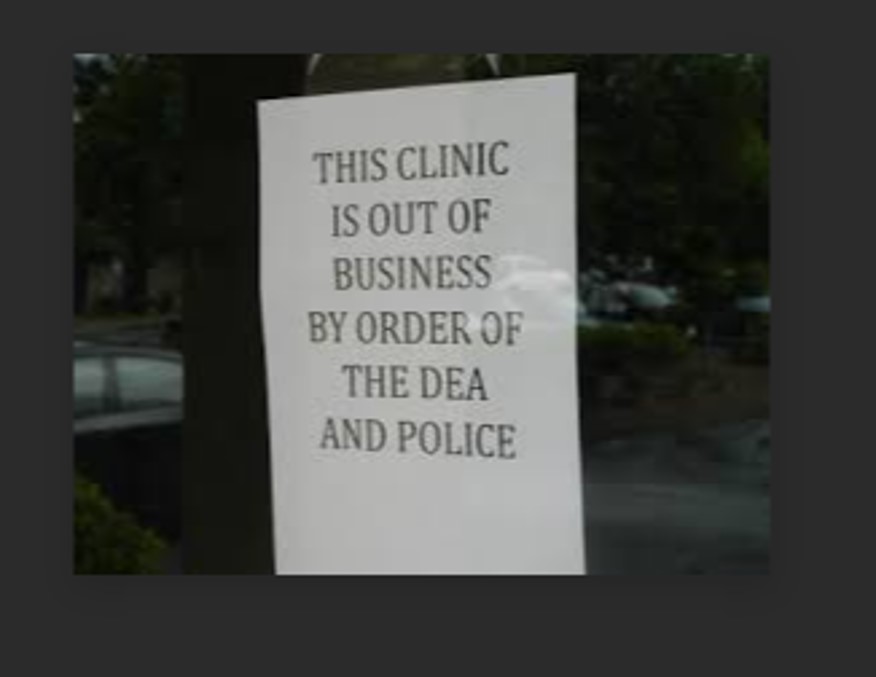
The Dangers of Pill Mills
Pill mills are extremely dangerous because they make it easy for people to abuse opioids. Opioids are a type of drug that is highly addictive and can be very harmful, even deadly, when misused. People who get opioids from a pill mill are more likely to misuse them because they don’t have to go through the proper channels to get the drugs. This means that more people are at risk of developing an addiction to opioids, and more people are likely to overdose on these drugs.
Pill mills also contribute to the overall opioid epidemic because they make it easy for people to get their hands on these drugs. Pill mills are often located in areas with a lot of poverty, and people may not have the money to pay for legitimate medical care. They’re likelier to turn to pill mills to get their needed drugs.
In the late 1990s, going into the 2000s, the rate of prescription opioid use began to rise, as did the number of overdose deaths related to prescription opioids. Oxycodone is a powerful opiate-based pain reliever sold under brand names such as OxyContin, Percocet, Percodan, and Tylox.
There were a lot of pill mills, a lot of unscrupulous physicians prescribing buckets full of oxycodone. There used to be the I-95, the “Oxy Express,” so people all along the East Coast of the United States would drive to Florida and access these pill mills. Following the crackdown on pill mills in Florida, Georgia became an attractive haven for them because the state had been slow to implement measures like a statewide database to track prescriptions and strict regulations for pain clinics.

Florida’s pill mills “opened fast and furious because there was very little regulation … and the majority of law enforcement was not trained to handle the movement of legal drugs for illegal purposes,” said a sheriff’s narcotics investigator in Broward County, the epicenter of the pill-mill boom.
By the clinics’ peak in 2010, 90 of the nation’s top 100 opioid prescribers were Florida doctors, according to federal officials, and 85 percent of the nation’s oxycodone was prescribed in the state. That year alone, about 500 million pills were sold in Florida. The number of people who died in Florida with oxycodone or another prescription opioid in their system hit 4,282 in 2010, a four-fold increase from 2000, with 2,710 of the deaths deemed overdoses, according to a state medical examiners’ report.
Makers of the opioid OxyContin promised to report pill mills to law enforcement in Tennessee but instead hid evidence and pushed providers to dole out more pills at higher doses for longer periods, even providing “savings coupons” to cash-paying addicts, court records show.
The City of Everett filed a lawsuit against Purdue Pharma, maker of the ubiquitous painkiller OxyContin. According to an (Everett) Herald report, city officials claim Purdue failed to stop selling its drug to pill mills that in turn supplied addicts across Snohomish County and elsewhere.
Signs of a Pill Mill
A few signs can indicate whether or not a doctor’s office is a pill mill. First, pill mills often prescribe large quantities of drugs without requiring a medical exam or testing. They may also prescribe multiple opioids to the same patient, which is extremely dangerous. In addition, pill mills may require cash payment only, and they may not accept insurance.
If you suspect a medical office may be a pill mill, it’s important to report it to the authorities.

America’s Pain Mills (American Addiction Centers Editorial Staff, November 30, 2023)
“We face a moment in our country where more than 100,000 of our fellow Americans die each year from drug overdoses,” United States Attorney Christopher R. Kavanaugh said. “We must do all we can to support those battling addiction disorders and prosecute those who prey on this disease.”
If you are aware of controlled substance violations in your community, you can submit your anonymous tip through the DEA online Tip Line.
As the fight against the opioid crisis continues, State and Federal Authorities are working to shut down phony Pain Clinics that are really just fronts for criminals who divert pharmaceutical drugs and hook a new generation of people with an addiction.
Red Flags for Pharmacies
A pharmacist’s professional responsibility includes looking for certain patterns (i.e., “red flags”) that are relevant to preventing the non-therapeutic dispensing of controlled substances.
AMERICAN PAIN ON AMAZON PRIME VIDEO
American Pain was a one-stop shop, supplying both prescriptions and painkillers. At the door, a hulking bouncer warned people not to snort their pills in the parking lot. That would attract the kind of attention that the clinic’s owners, twin brothers Chris and Jeff George, were trying to avoid.
But it was too late. Local and federal investigators were nearby, watching every move. These are scenes from a new CNN Films documentary, “American Pain,” which details the George brothers’ rise and fall as opioid kingpins.
“They became the largest street-level distribution group operating in the entire United States,” McKenzie added. “Nobody put more pills on the streets than they did. Nobody … and they were operating in broad daylight.”
America’s Pill Mills (American Addiction Centers, November 2023)
Of the survey respondents who said they were on prescription painkillers for minor surgery (such as a tooth extraction), 1.6 percent have been on medication for more than a year. About 48 percent have been on painkillers for between one week and one month. When it comes to chronic pain, though, 38 percent of respondents being treated have been on opioids for more than a year. For injuries, 10.7 percent have been on painkillers for more than a year, while 13 percent of respondents being treated for major surgery have been on medication for more than a year.
While addiction doesn’t always happen immediately, opioid tolerance does increase, resulting in a need for higher dosage. A patient being treated for a minor surgery may then find themselves needing more medicine because the original dosage is no longer adequately relieving pain.
Between 1999 and 2017, an estimated 250,000 Americans died from overdoses involving prescription painkillers, a plague ignited by Purdue Pharma’s aggressive marketing of OxyContin. Families, working class and wealthy, have been torn apart, businesses destroyed, and public officials pushed to the brink. Meanwhile, the drugmaker’s owners, Raymond and Mortimer Sackler, whose names adorn museums worldwide, made enormous fortunes from the commercial success of OxyContin.
In Pain Killer, Barry Meier tells the story of how Purdue turned OxyContin into a billion-dollar blockbuster. Powerful narcotic painkillers, or opioids, were once used as drugs of last resort for pain sufferers. But Purdue launched an unprecedented marketing campaign claiming that the drug’s long-acting formulation made it safer to use than traditional painkillers for many types of pain. That illusion was quickly shattered as drug abusers learned that crushing an Oxy could release its narcotic payload all at once. Even in its prescribed form, Oxy proved fiercely addictive. As OxyContin’s use and abuse grew, Purdue concealed what it knew from regulators, doctors, and patients.
Here are the people who profited from the crisis, those who paid the price, those who plotted in boardrooms, and those who tried to sound alarm bells. A country doctor in rural Virginia, Art Van Zee, took on Purdue and warned officials about OxyContin abuse. An ebullient high school cheerleader, Lindsey Myers, was reduced to stealing from her parents to feed her escalating Oxy habit. A hard-charging DEA official, Laura Nagel, tried to hold Purdue executives to account.
In Pain Killer, Barry Meier breaks new ground in his decades-long investigation into the opioid epidemic. He takes readers inside Purdue to show how long the company withheld information about the abuse of OxyContin and gives a shocking account of the Justice Department’s failure to alter the trajectory of the opioid epidemic and protect thousands of lives. Equal parts crime thriller, medical detective story, and business exposé, Pain Killer is a hard-hitting look at how a supposed wonder drug became the gateway drug to a national tragedy.
Understanding Drug Overdoses and Deaths (Centers for Disease Control and Prevention)
Researchers from the Centers for Disease Control and Prevention report that Schedule II prescription painkillers, like oxycodone, cause more drug overdose deaths than cocaine and heroin combined. Oxycodone and other Schedule II drugs have a high potential for abuse and can be crushed and snorted or dissolved and injected to get an immediate high. This abuse can lead to addiction, overdose, and sometimes death.
What Are Some Signs There Is a Pill Mill In Your Community?
Pill mills have been around in almost every one of the United States. Many are found in the Southern States. However, there are still pill mills opening up around the country. If you suspect there is a pill mill in your community, some signs to confirm this may include the following:
- Cash is the only form of payment accepted.
- Physical exams are not given.
- Prescription pills are the only way doctors treat pain.
- Crowds are formed around the building in lines.
- Many cars are in and out of the building parking lot.
- Pharmacists complain about the doctors.
- Other businesses complain about the office or facility.
- Patients aren’t in the building long for their appointments.
- Shady or unusual characters around the building.
- X-rays and medical records aren’t needed for appointments.
- Doctors send patients to a specific pharmacy.
- Patients can pick what medicine they want.
- Drugs are being used and sold right outside the building.
- Security guards are on the premises.
If you recognize any of these signs, you can submit your anonymous tip through the DEA online Tip Line and report the doctors or facility. Pill mills are a problem. If the citizens of the community report they see signs of suspicious activity and more businesses keep an eye out for the above-mentioned signs as well, hopefully, these pill mills can be limited.
Within the last decade, abuse and misuse of certain prescription drugs, especially pain medications, has become prevalent. The opioid crisis and drug overdoses continue to devastate our states and local communities.
Donations to Support this Website are Always Welcome.
Related Investigations
How State and Federal Authorities are Dismantling Pill Mills in the United States
Authorities Crack Down on Pharmacists Fulfilling and Dispensing Massive Amounts of Pain Pills
How Authorities Are Shutting Down Texas Pain Clinics Enormous Pill Prescriptions
How Authorities Have Shuttered Georgia Pain Clinics Massive Pain Pill Distribution
How Pain Clinic Owners Turned Patients’ Pain into Enormous Profits
How Federal Agencies are Shutting Down Maryland Pain Clinics Operating as Pill Mills
How Authorities Are Cracking Down on Virginia Pain Clinics Massive Pain Killer Pill Operations
How Authorities Are Cracking Down on Rogue Pain Clinics in Florida
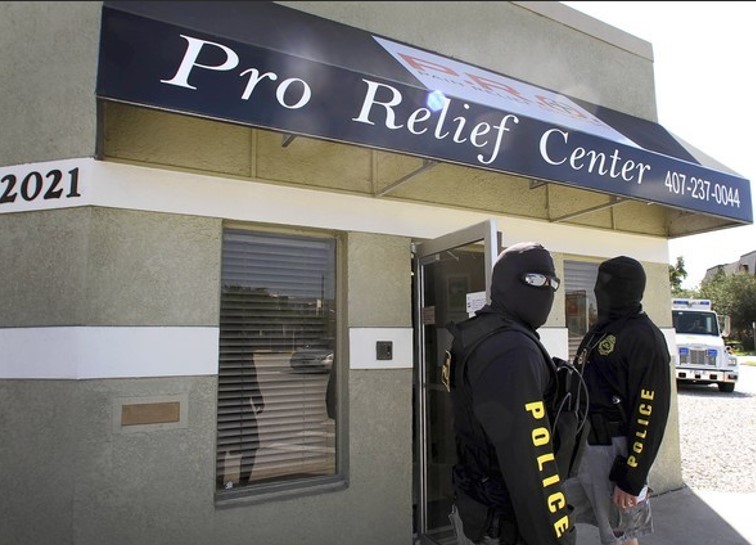
How to Recognize a Pain Pill Mill in Your Community
ADD COMMENTS BELOW
- Moving and Relocating to Atlanta: How to Find Your New Home
- Money Matters: Insider Tips to Buying a Home
- Renting vs Owning a Home
- 3 Powerful Benefits of Using Managed WordPress Web Hosting
- Ways to Build Positive Credit
- Do It Yourself Credit Improvement Process
- Guides to Backpacking, Mountain Biking and Hiking Georgia
- How to Create an Ergonomic Workspace at Home or Work
- Backpacking, Hiking, and Camping Safety Guides
- A Trail of Clues to the Murder of Nicole Brown Simpson
- How Centra Tech’s Bitcoin Cryptocurrency Scheme Was Hatched and Discovered
- Starting a New Business as a New Mother: Tips for Thriving
- Balancing Success: Practical Self-Care Strategies for Entrepreneurs
- Guides to Backpacking and Hiking the Carolinas
- Guides to Hiking New York State and New Jersey
- Guides to Backpacking and Hiking Canada
- Guides to Hiking California and Nevada
- Email Marketing Campaigns for Small Business Owners
- The Tragic Murder of Rebecca Postle Bliefnick
- How a Grad Student Murder Spotlights Female Joggers’ Safety Concerns
- How Massive Commercial Financial Fraud Was Discovered in Singapore
- Guide to Martha Stewart’s Hugely Successful Concept and Art of Presentation
- Did Billy Ray Turner Conspire with Sherra Wright to Kill Former NBA Player Lorenzen Wright?
- How Operation Rebound’s 7-Year Cold Case was Finally Solved
- Stylish Outdoor Fire Pits and Patio Heaters
- Mastering DIY Marketing: Essential Skills and Strategies for Small Business Owners
- Great Deals on Snug UGG All-Season Boots
- How a GeoLocation Expert Tracked a Killer
- Transgender Law Enforcement Officer Denied Medical Coverage for Gender Dysphoria
- How Video Surveillance Cameras Helped Identify and Track a Killer
- How Investigators Solved the Murder Mystery of Army Sergeant Tyrone Hassel III
- How a Love Obsession Led to the Brutal Murder of Anna Lisa Raymundo
- How Stephen Grant Tried to Get Away with Killing His Wife
- How Unrelenting Catfish Schemes Led to Fatal Suicide
- How Pain Clinic Owners Turned Patients’ Pain into Enormous Profits
- How to Recognize a Pain Pill Mill in Your Community
- How Authorities Have Shuttered Georgia Pain Clinics Massive Pain Pill Distributions
- How Pain Doctors Massive Opioid Prescriptions Lead to Pain Pill Overdose Deaths
- How Authorities Are Dismantling Pennsylvania Pain Clinics Prescribing Excessive Amounts of Opioid Pain Pills
- How Authorities Are Dismantling Alabama Pain Clinics Pain Pill Schemes
- How the Gilgo Beach Homicide Investigation Has Progressed
- How NYC Architect was Linked to Three Women’s Remains Found on Gilgo Beach
- How Investigators Discovered a Serial Killer Hiding in Plain Sight
- How Police Discovered the Concealed Murders of the Chen Family
- How a Vicious Child Custody Battle Led to the Murder of Christine Belford
- How Authorities Finally Captured a Serial Killer in Southern Louisiana
- How Authorities Are Busting Pill Mills in The Carolinas
- Unsolved Mystery: Triple Murder at the Blue Ridge Savings Bank
- How Montgomery County Police Quickly Unraveled the Murder of a Retail Store Employee in Bethesda
- How a Child Rapist and Murderer Almost Got Away with His Crimes in England
- How Authorities Are Dismantling Pill Mills in the United States
- How Federal Agencies Are Dismantling Michigan Pain Clinic Doctors Scheme to Distribute Enormous Amounts of Opioid Pain Pills
- How Authorities Are Cracking Down on Virginia Pain Clinics Massive Pain Pill Operations
- How Authorities Are Honing in on Kentucky Pain Clinics Distributing Opioid Painkiller Pills for Profit
- How Federal Agencies Are Shutting Down Maryland Pain Clinics Operating as Pill Mills
- How Federal Agencies Are Dismantling New York Pain Clinics Vast Pain Pill Operations
- How the Senseless Murder of Tequila Suter Was Quickly Solved
- How Authorities Are Dismantling Ohio Pain Clinics Prescribing Excessive Pain Pills
- How Authorities are Dismantling Tennessee Pain Clinics Prescribing Massive Quantities of Opioid Pain Pills
- How State and Federal Agencies Are Shuttering California Pain Clinics Huge Distribution of Opioid Pain Pills
- How Authorities Are Shutting Down Texas Pain Clinics Enormous Pill Prescriptions
- How Authorities Are Cracking Down on Rogue Pain Clinics in Florida
- George Brothers Used Pain Clinics to Disburse Oxycodone Pain Killer Pills
- How Authorities Have Convicted Pharmacists Fulfilling and Dispensing Massive Amounts of Pain Pills
- Timeline of Events Leading to Rudy Giuliani’s Legal Troubles
- Georgia Election Workers Defamation Lawsuit and Trial
- Rudy Giuliani’s Election Fraud Allegations and Ensuing Lawsuits
- British Singer George Michael’s Last Christmas
- Shaping Tomorrow’s Leaders
- Kathleen Peterson’s Mysterious Staircase Death: Accident or Homicide?
- How Police Officer Stephanie Lazarus Almost Got Away with Murder
- Mysterious Staircase Death Investigations
- Elizabeth Ratliff’s Mysterious Staircase Death in Germany
- The Death of Vincent Foster Remains a Mystery 30 Years Later
- Biloxi Murder Conspiracy: A High-Stakes Crime